Schedule
| 10:00AM | Opening and Welcome Remarks
|
| 10:30AM | Panel I: Resource Extractivism as (Slow) Violence
|
| 12:00PM | Lunch |
| 1PM | Keynote Presentation Beyond the Gap: from Wall Street conservation to nature-based reparations
|
| 2PM |
Coffee Break |
| 2:15PM | Panel II: Market Environmentalism and the Cost of Extraction
|
| 3:45PM | Coffee Break |
| 4PM | Panel III: Beyond Extraction: Indigenous and Abolition Ecologies
|
| 5:30PM | Closing
Reception for Attendees |
Speakers
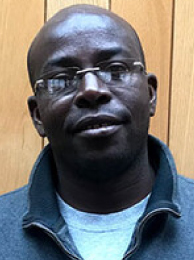 |
Nixon BoumbaNixon Boumba is a social justice activist who uses the human right framework to achieve social change in Haiti. For the last two decades, Boumba has devoted himself to being an organizer and a part of the student movement, the paysans’ movement, women and feminist movements, and the movement to access basic services in the slum areas particularly in Port-au-Prince. Since the earthquake, Boumba worked with mining organizers, the land rights and reform movement, the anti-corruption movement, and the movement around the mega-project in the country. Since 2017, Boumba has worked as a capacity-builder for the LGBTI movement. Boumba has a Bachelor’s in Sociology and is doing a Master’s degree in history at the state University in Haiti. For the last 6 years, he has worked as the Haiti country consultant for the American Jewish World Service. In 2017, he was a Senior Human Rights Fellow at the Schell Center for Human Rights at Yale Law School. |
 |
Jessica DempseyJessica Dempsey is an Associate Professor in the Department of Geography at the University of British Columbia. Her current research centers on the political economy drivers of biodiversity loss, and seeks to understand escalating ecological decline in a time of unprecedented efforts to arrest them. |
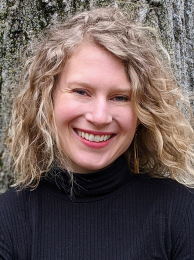 |
Andrea MarstonAndrea Marston is Assistant Professor in the Department of Geography at Rutgers University. Her research explores the political economy and cultural politics of resource extraction and energy governance, primarily in Latin America. Her book, Subterranean Matters: Cooperative Mining and Resource Nationalism in Plurinational Bolivia, is forthcoming with Duke University Press in March 2024. |
 |
James McCarthyJames McCarthy is the Leo L. and Joan Kraft Laskoff Professor of Economics, Technology and Environment in the Graduate School of Geography at Clark University where he has served as both the Director of Graduate School of Geography. He has also been the Nature-Society editor of the Annals of the American Association of Geographers. McCarthy’s work analyzes the interactions of political economy and environmental politics, with particular emphases on renewable energy, environmental politics, and rural social movements. His current research focuses on the relationships among climate change, renewable energy, and the future of capitalism, focusing in particular on the ways in which a renewable energy sector booming in the context of climate change is taking up land and other natural resources in ways that may slow further climate change on the one hand, but perpetuate and exacerbate existing injustices on the other. He is currently exploring three major theoretical questions about these dynamics: how to analyze renewable energy as an emergent and rapidly growing industry in a capitalist economy; how to analyze and promote the democratic and anti-capitalist potential many see in renewable energy technologies; and how to think both comparatively and relationally about the different trajectories of renewable energy development and deployment in the global North and South. He has published widely on these themes in geography and related disciplines, including three major edited volumes and over 50 articles and chapters. |
 |
Sienna Merope-SyngeSienna Merope-Synge is Co-Director of the Caribbean Climate Justice Initiative and the Director of the Indigenous Land Rights and Earth Defense project in the Global Justice Clinic at NYU School of Law. Both projects partner with communities and organizations on the frontlines of the climate crisis to defend their environmental, economic, social and cultural rights, and support efforts to secure land rights and build community power. Sienna was previously the Legal Director at the Institute for Justice & Democracy in Haiti (IJDH) where she led the organization’s work seeking accountability for emblematic human and environmental rights violations in Haiti, including efforts to secure remedies for victims of the UN-introduced Haiti cholera epidemic and child support for victims of sexual exploitation by UN peacekeepers. She worked between New York and Port-au-Prince from 2015 to 2020 and speaks fluent French and Haitian Creole. Sienna received her LLM from NYU School of Law in 2015, where she was a Hauser global scholar. She holds political science and law degrees with first class honors from the University of Melbourne, Australia. |
 |
Theresa Rodriguez-MoodieDr. Theresa Rodriguez-Moodie is an environmental scientist and Chief Executive Officer (CEO) at the Jamaica Environment Trust (JET) where she leads its environmental advocacy programme and works on projects geared towards the protection of Jamaica’s natural resources and public health. She is a Geographer with a BSc and PhD from the University of the West Indies. Her PhD was in the area of coastal geomorphology (the study of coastal processes and how it influences coastlines) and paleoclimatology (the study of past climate). Prior to joining JET, she worked for over 10 years on a variety of projects as an Environmental Scientist and Climate Change Vulnerability Specialist, locally and regionally for private sector, government, and multilateral agencies. |
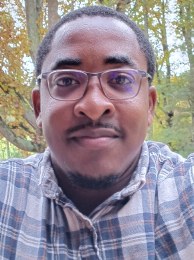 |
Alex MoultonAlex A. Moulton is an Assistant Professor in the Department of Geography and Environmental Science at Hunter College. Previously, he was a faculty member in the Department of Sociology and Department of Geography and Sustainability at the University of Tennessee—Knoxville. His research is concerned with Black geographies and ecologies, socio-ecological justice, political ecology of memory, histories of the plantation and marronage. Questions of care, Black peoples’ flourish, and repair inform his research and writing. His academic work has been published in journals such as Caribbean Geography, Geography Compass, Sociology Compass, Environment and Planning, the Journal of Political Ecology, as well edited volumes. Present projects include Black Geographers on Film—A digital archives of Black geography, and an edited volume on The Futurities of Climate Change. |
 |
Donisio SholDonisio Shol is Q’eqchi Maya an indigenous person from Southern Belize. He has been engaged in advocacy for Indigenous Peoples and Local Communities on climate change, biodiversity conservation, development, and human rights since a teenager, and continues to volunteer in his community. During the last 5 years, he has provided technical support to the auto-delimitation, demarcation, and titling of the entire Maya territory as a part of the implementation of the CCJ Consent Order. He has also provided support to the governance system of the Maya communities to actively strengthen their land governance institutions, representation, and decision-making processes. He is also working with Indigenous Maya youth in amplifying their voices through digital media platforms to facilitate and enrich the social, cultural, and intellectual well-being of Indigenous youth. Donisio Holds a Master Degree In Agriculture engineering from the National Pingtung University Of Science and Technology, Taiwan. |
 |
Kimberley ThomasKimberley Thomas is a political ecologist and Assistant Professor of Human-Environment Geography at Temple University. Her research on environmental justice and agrarian change in the Mekong and Ganges Deltas examines the political economy of adaptation, the relational production of security and insecurity, and the vulnerabilizing effects of water infrastructure at multiple scales. This work has been supported through funding from the Fulbright U.S. Scholar Program, the Council of American Overseas Research Centers, and the Institute for Human Geography, and has appeared in a range of journal outlets including Global Environmental Change, Annals of the American Association of Geographers, Political Geography, Development and Change, and WiRES Climate Change. |
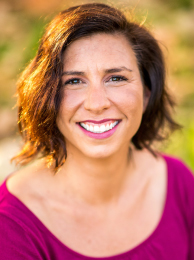 |
Megan YbarraMegan Ybarra is an Associate Professor in the Department of Geography at the University of Washington in Seattle. Her research and teaching focus on environmental justice, abolition and Latinx migrations. Her second book, Green Wars / Guerras Verdes, exposed the role of international conservation NGOs in criminalizing Indigenous land defenders in national parks and called for land repatriation from Guatemalan protected areas to Q’eqchi’ Maya Indigenous peoples. She has a book manuscript under review titled The Aroma of Tacoma: Radical Placemaking for Abolition and Environmental Justice. She serves on the Editorial Boards of Antipode: A Radical Journal of Geography; Environment and Planning D: Society & Space; and The Professional Geographer. Her community engagement includes participation in the inaugural 2023-2024 cohort of Scholars for Social Justice (Abolition, Reparations, Investment, Safety — ARIS) Study Circle; core organizer with Liberation Media Northwest and Nuestro Grupo Cultural (the Latinx incarcerated cultural group across Washington State Department of Corrections facilities); and Secretary with the Davis-Putter Scholarship Fund for scholar-activists. |
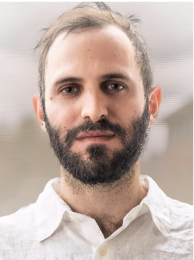 |
Fábio ZukerFábio Zuker is an anthropologist, journalist, and essayist. His research interests span from indigenous ecologies and politics, environmental violence, deforestation, plantations, infrastructures and authoritarianism. He is currently a postdoctoral research associate at Princeton University and is the author of The Life and Death of a Minke Whale in the Amazon: Dispatches from the Brazilian Rainforest, translated by Ezra E. Fitz and published by Milkweed Editions in 2022. |
